

Policy: Twenty tips for interpreting scientific claims. Science and policy have collided on contentious issues such as bee declines, nuclear power and the role of badgers in bovine tuberculosis.
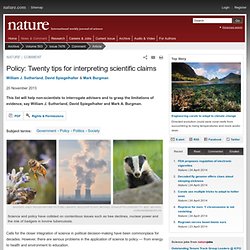
Calls for the closer integration of science in political decision-making have been commonplace for decades. However, there are serious problems in the application of science to policy — from energy to health and environment to education. One suggestion to improve matters is to encourage more scientists to get involved in politics. Although laudable, it is unrealistic to expect substantially increased political involvement from scientists.
Another proposal is to expand the role of chief scientific advisers1, increasing their number, availability and participation in political processes. Einstein to Weinstein: the lone genius is an exception to the rule (ScienceAlert) Albert Einstein was considered to be a ‘lone genius’ – but this was not the case, and it’s certainly not the norm, writes Katherine J Mack.

Image: Catwalker/Shutterstock Developing a Theory of Everything is physics' Holy Grail. Nature by numbers. The theory behind this movie. We can find interactive sites on the internet (like this) to draw points, move them, and check how the structure becomes updated in real time.
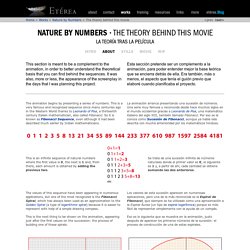
Dark energy: A new standard model for physics? Long-Term Science: When Research Outlives The Researcher. Hide captionWilliam Beal, standing at center, started a long-term study on seed germination in 1879.
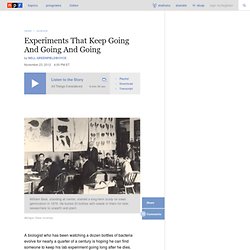
He buried 20 bottles with seeds in them for later researchers to unearth and plant. Michigan State University William Beal, standing at center, started a long-term study on seed germination in 1879. He buried 20 bottles with seeds in them for later researchers to unearth and plant. A biologist who has been watching a dozen bottles of bacteria evolve for nearly a quarter of a century is hoping he can find someone to keep his lab experiment going long after he dies. Meanwhile, just by coincidence, a botanist who works across campus is carefully tending an experiment that started before he was born, all the way back in 1879. These two researchers, both at Michigan State University in East Lansing, represent different sides of an unusual phenomenon in science: experiments that outlive the people who started them. Most researchers design studies to churn out results as quickly as possible. G.L. Thomas Kuhn: the man who changed the way the world looked at science. Fifty years ago this month, one of the most influential books of the 20th century was published by the University of Chicago Press.
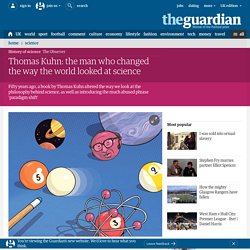
Many if not most lay people have probably never heard of its author, Thomas Kuhn, or of his book, The Structure of Scientific Revolutions, but their thinking has almost certainly been influenced by his ideas. The litmus test is whether you've ever heard or used the term "paradigm shift", which is probably the most used – and abused – term in contemporary discussions of organisational change and intellectual progress. A Google search for it returns more than 10 million hits, for example. And it currently turns up inside no fewer than 18,300 of the books marketed by Amazon. It is also one of the most cited academic books of all time. Horizon - Richard Feynman interview. Symphony of Science - The Poetry of Reality (An Anthem for Science) KA's ThoK-Notes: Natural Science.
Having considered so far (a) a definition of knowledge, (b) some of the foundations of knowledge -- perception, memory and language -- and (c) logic, by means of which we are able to deduce new propositions from what is already known, we shall now look at the first system of knowledge, that of the natural sciences. There is a widespread, though usually unspoken, belief that science is a source of reliable, objective knowledge about reality, or even the only such source; and that scientific knowledge is certain and has been 'proved' in some sense. In this section we shall critically examine this belief. A good starting point may be to think of science as a human or social activity with certain rules, so that someone who is not following the rules is just not doing science -- just as someone who is not following the rules of chess is not playing chess.
In these terms, then, we will try to investigate the rules that science follows. 1. Exercise 1.1 Exercise 1.2 Exercise 1.3 Exercise 1.4 2. 3. The Scientific Method. The Scientific Method For centuries, people based their beliefs on their interpretations of what they saw going on in the world around them without testing their ideas to determine the validity of these theories — in other words, they didn’t use the scientific method to arrive at answers to their questions.
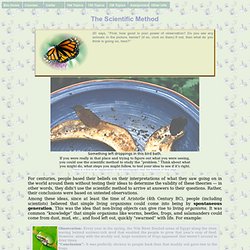
Rather, their conclusions were based on untested observations. Among these ideas, since at least the time of Aristotle (4th Century BC), people (including scientists) believed that simple living organisms could come into being by spontaneous generation. This was the idea that non-living objects can give rise to living organisms. It was common “knowledge” that simple organisms like worms, beetles, frogs, amd salamanders could come from dust, mud, etc., and food left out, quickly “swarmed” with life. Ten Myths of Science. What is Science? What is science?
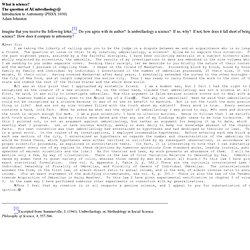
The question of AUmbrellaology@ Introduction to Astronomy (PHSX 1030) Adam Johnston Imagine that you receive the following letter. Do you agree with its author? ADear Sir: I am taking the liberty of calling upon you to be the judge in a dispute between me and an acquaintance who is no longer a friend.